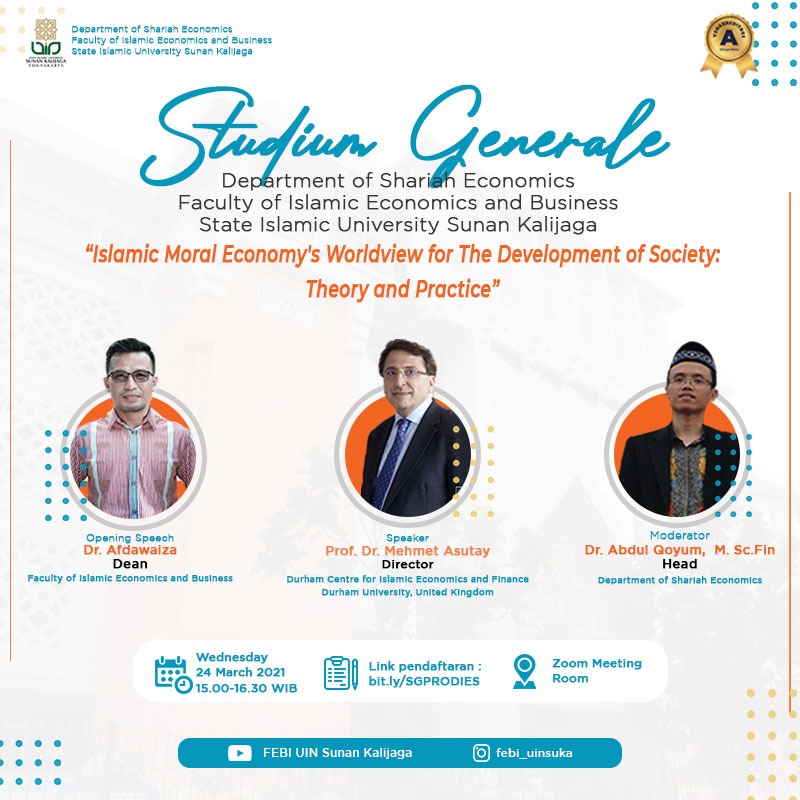STADIUM GENERALE OF ISLAMIC ECONOMICS STUDY PROGRAM

On Wednesday, March 24, 2021, the Islamic Economics study program, FEBI, UIN Sunan Kalijaga held a virtual Stadium Generale event under the theme "Islamic Moral Economy’s Worldviews for the Development of Society: Theory and Practice," featuring Prof. Dr. Mehmet Asutay as the keynote speaker. The event commenced at 14.00 WIB with an opening address by the MC, followed by the rendition of the Indonesian national anthem and a welcoming speech by the Dean of FEBI, Dr. Afdawiza, M.Ag. Prof. Dr. Mehmet Asutay then delivered the main presentation, with Dr. Abdul Qoyum serving as the moderator. The event was attended by 300 participants, including lecturers, students, and the general public.
During his presentation, Prof. Dr. Mehmet Asutay underscored the significance of morality in both economic and societal progress. He stressed that in a community, enhancement should not be limited to economic and financial activities alone, but should encompass all facets of life. For instance, in the current pandemic, health considerations have a substantial impact on the economy, and economic advancement cannot be achieved without a focus on health. In line with the pursuit of life balance, Islamic Economics prioritizes the attainment of "falah" over mere satisfaction (utilization). The guiding paradigm is "mizan," applicable not only in economics but across all spheres of life. According to this perspective, everyone should have access to the resources bestowed by Allah SWT.
The core of Islamic Moral Economy (IME) is justice, which fosters equality through the extensive practice of ihsan. This should be the maqashid syariah of Islamic finance. In reality, societal inequality is greater than commonly perceived. IME seeks to diminish or even eliminate this inequality through the principle of mizan (balance). Any disruption of mizan leads to economic, social, environmental, and human rights crises.
Understanding the axioms developed in IME, namely tauhid, adâlah and ihsan, tazkiyah, and rububiyah, is crucial. Together with the reinforcement of maqashid syariah, these axioms will cultivate trust in every individual in society. Trustworthy individuals will foster a khalifah mindset (leadership spirit) that is accountable for upholding the rights of individuals around them, nurturing a strong sense of brotherhood.
When IME is deeply rooted in society and imparted as a guiding principle, it will engender a corruption-free society, alleviate poverty, and guarantee social justice, thereby fostering sustainable economic development.
Prof. Dr. Mehmet Asutay concluded his presentation by stating that this remains a longstanding challenge. Therefore, there are several tasks that must be addressed in the future, both in the short and long term. In the short term, enhancements can be pursued in various areas such as the advancement of socially oriented financial institutions, bolstering the real sector economy, waqf and zakat, entrepreneurship, and other pertinent domains.
Following the presentation, a Q&A session was conducted, moderated by Dr. Abdul Qoyum. Numerous questions were posed, but due to time constraints, only a few were addressed. One question, raised by Listiana, inquired about the universal acceptance of IME, given its inherently universal values. Prof. Dr. Mehmet Asutay responded that people will assess the outcomes, and if positive results from IME can be demonstrated, the entire world will embrace it, irrespective of their religious beliefs. Another question, from Ash Nov Ahmada, inquired about the application of IME to society, considering that the Indonesian government's system is based on conventional economics. Prof. Dr. Mehmet Asutay replied that he does not view the state as synonymous with society. He emphasized that the concept of TIME is deeply individual, hence he referred to "an ihsani society, not a state." He emphasized that IME anticipates individual ihsani, leading to an ihsani society. He stressed that the process of macro development is more significant than status. Cultivating an ihsani individual will pave the way for the establishment of an ihsani society, deeply rooted in their history. While acknowledging that TIME may appear utopian, he asserted that reality cannot be achieved without dreams. The final question, from Lailatis Syarifah, inquired about the potential contributions of the Islamic Economics study program to the advancement of IME. Prof. Dr. Mehmet Asutay suggested that the program should endeavor to develop an ihsani curriculum, focusing not only on knowledge acquisition but also on nurturing students with the qualities of ihsan.
Following the discussion session, the Stadium Generale event concluded with a prayer and a group photo. The event ended promptly at 17.00 WIB. Red
